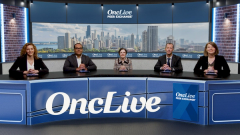
Opinion|Videos|July 22, 2024
Overview of DESTINY-Breast06
Aditya Bardia, MD, MPH, shares comprehensive insights on the DESTINY-Breast06 study evaluating T-DXd in HER2-low and HER2 ultra-low metastatic breast cancer, and the panel offers its initial impressions.
Advertisement
Episodes in this series

Video content above is prompted by the following questions:
- Briefly discuss the DESTINY-Breast06, including study design, primary endpoints, and safety:
- DESTINY-Breast06 evaluating T-DXd vs investigators choice of chemotherapy in HER2-low, HR+ mBC.
- Based on the above data, how might this impact practice patterns in HER2-low and HER2 ultra-low disease?
- Would the avail of first-line T-DXd for HER2-low and HER2 ultra-low patients influence your approach in the number of regimens of endocrine therapy you recommend to patients?
- DESTINY-Breast06 evaluating T-DXd vs investigators choice of chemotherapy in HER2-low, HR+ mBC.
Advertisement
Latest CME
Advertisement
Advertisement
Trending on OncLive
1
Long-Term Cilta-Cel Data Show Low Rates of PFS Events in Standard-Risk R/R Myeloma
2
Single-Center, Retrospective Data Show Low Rate of Lifileucel Infusion Following Referral in Advanced Melanoma
3
Real-World Data Support Clinical Benefit With Lifileucel in Previously Treated Advanced Melanoma
4
Dr Riedell on the Long-Term Efficacy of Tisa-Cel in R/R Follicular Lymphoma
5





































